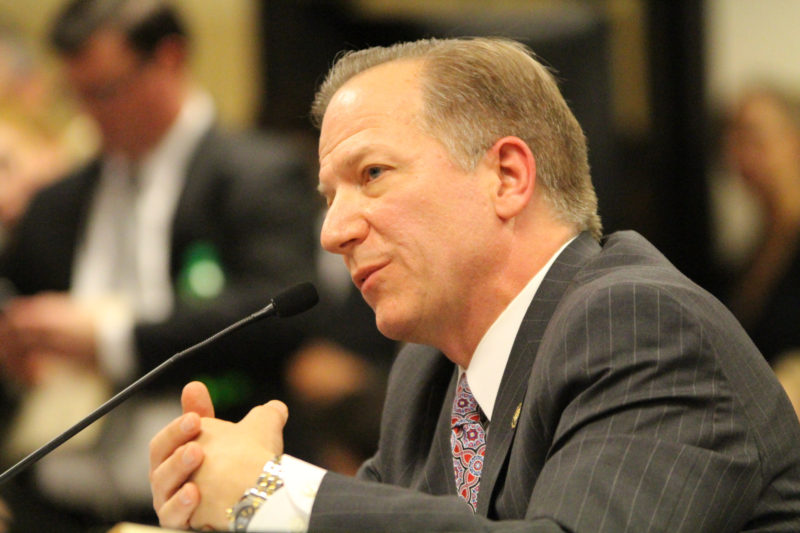JEFFERSON CITY, Mo. – The Senate Seniors, Families and Children Committee heard testimony from abortion-choice advocates and anti-abortion groups on Wednesday regarding five bills aimed at restricting the practice in the state.
The slate of anti-abortion legislation offered by Republican lawmakers would, among other things, prohibit abortions performed on basis of sex, race or Down Syndrome; require referrals for out of state abortions to be accompanied by specified printed materials; and amend certain procedures regarding the donation of fetal tissue, tissue reports and abortion facility inspections.
That last bill presented by Sen. Bob Onder, R-St. Charles, comes as a result of findings by the Senate Sanctity of Life Committee investigation which started in the summer of 2015. Onder testified the regulations in the “Women’s Health and Clinic Safety Act” were necessary to ensure the safety of women in the state.
“SB 67 is meant to uphold medical standards, protect women, and guard against the kind of abuses that have occurred in abortion clinics in this country,” Onder said. “It is long overdue.”
Susan Klein, the legislative liaison of Missouri Right to Life, said the inspections would help ascertain whether or not Missouri’s lone abortion clinic in St. Louis was involved in the trafficking of fetal tissue. Those allegations came as a result of video tapes released by an anti-abortion group accusing Planned Parenthood of selling organs and other tissues from abortions. The authenticity of those claims has been debated by Republicans and Democrats along partisan lines across the nation.
“It behooves the state to find out if there is a market being pushed in the state of Missouri by abortion facilities,” Klein said.
Democrat Sen. Maria-Chappelle Nadal said she found the bill’s classification as “pro-life” disingenuous. She said repeatedly in the past she utilized Planned Parenthood’s reproductive health services.
“Targeting one entity in the state is offensive to me,” Chappelle-Nadal said.
NARAL Missouri Executive Director Alison Dreith said her organization opposed the bill in its totality but focused on the provisions that would prohibit the use of fetal tissue in medical research. Her own grandmother suffers from Alzheimer’s disease.
“Fetal derived cells are being tested in the laboratory to potentially begin clinical trials for Alzheimer’s disease,” Dreith testified. “If the Missouri General Assembly wanted to save lives, fetal tissue donation would be the perfect opportunity to not only save lives but help Missouri’s economy and institutions.”
NARAL also took time Monday to hand out yard signs to members of St. Louis’ Central West End neighborhood with signs reading “This neighborhood trusts women” pointing towards Gov. Eric Greitens’ home in the community.
Already stopped by 3 of @EricGreitens neighbors homes who want him to know #ThisNeighborhoodTrustsWomen pic.twitter.com/JTnCQBWD9U
— NARAL Missouri (@NARALMissouri) January 16, 2017
The push for more anti-abortion statutes comes in the wake of a lawsuit filed by Planned Parenthood against the state challenges two of Missouri’s abortion laws: one which classifies abortion facilities as ambulatory surgical centers (ASCs) and another requiring admitting privileges for abortion doctors at a nearby hospital. The lawsuit came in the wake of last year’s Whole Woman’s Health v. Hellerstadt decision, which declared two highly similar Texas laws unconstitutional.
Onder said in the wake of that decision he removed portions of the bill dealing with ASCs and admitting privileges that were in the bill when he offered it last session.
Another bill, offered by Sen. Wayne Wallingford, would protect the First Amendment rights of alternatives-to-abortion agencies. He and supporters of the bill argued an ordinance pending in St. Louis would directly interfere with the practices of maternity homes and pregnancy resource in the city.
“This ordinance would penalize Our Lady’s Inn and other related pro-life groups for their religious beliefs opposing abortion,” said Gloria Lee, the executive director of Our Lady’s Inn, a St. Louis-based maternity home.
St. Louis City Alderman Christine Ingrassia said earlier this month she would propose the ordinance to create a “buffer zone” around abortion clinics. Proponents of the ordinance argue it would still allow protesters to their freedom of speech, but would also ensure the safety of patients using the clinic. Sen. Jill Schupp argued the Wallingford’s bill would serve as a preemption of local control, and Dreith argued the alternatives-to-abortion clinics mislead women with biased and non-factual information about the abortion process.
Debate on those two bills went long, and three bills on the committee’s docket had yet to be heard as of press time. Those bills are Sen. Andrew Koenig’s bill to grant the Attorney General concurrent original jurisdiction to enforce the state’s abortion laws, Sen. David Sater’s bill to prohibit certain selective abortions relating to sex, race, or Down Syndrome, and Sen. Jeanie Riddle’s bill to require referrals for out of state abortions to be accompanied by specified printed materials.








